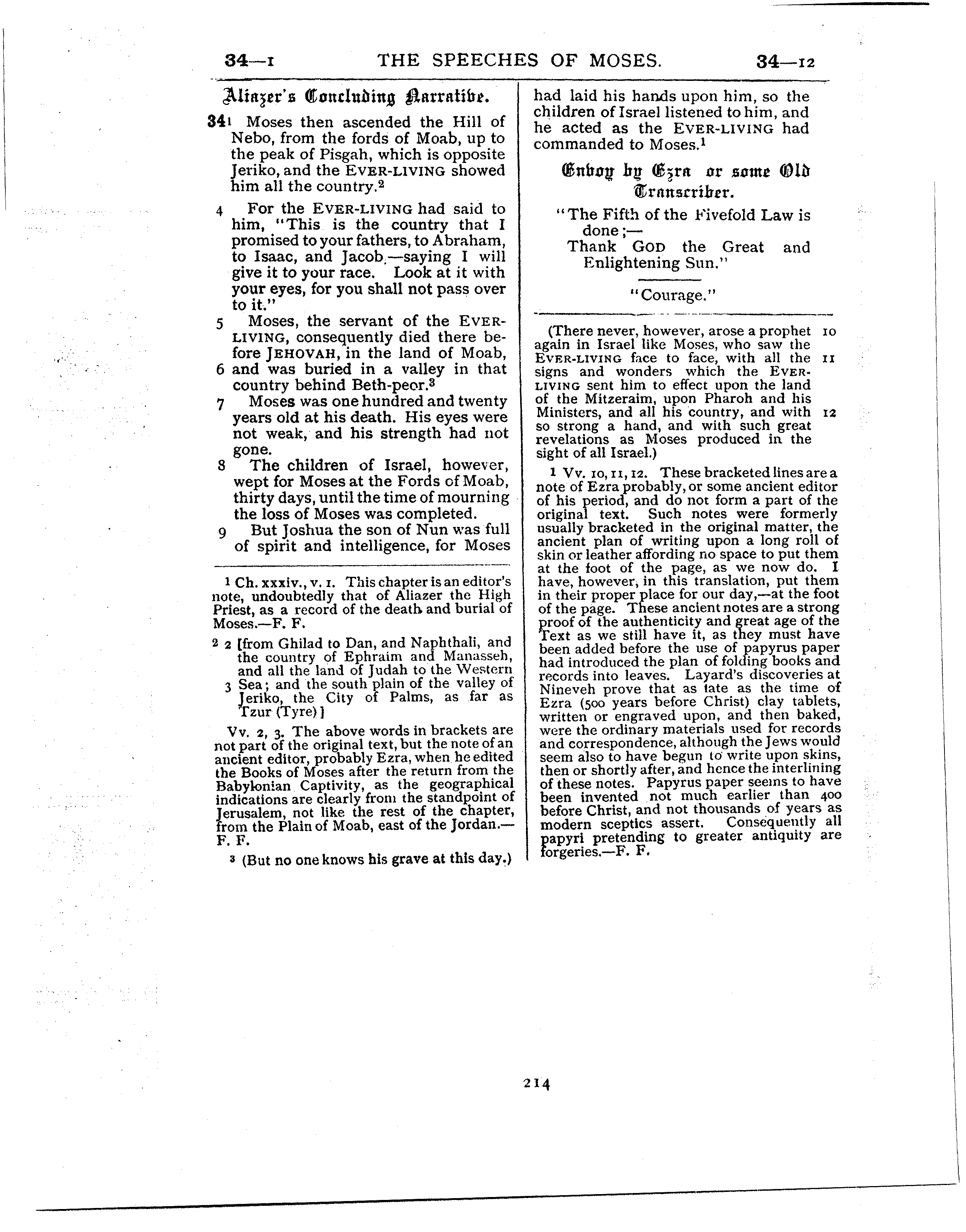Deuteronomy (The Speeches of Moses) - Ferrar Fenton Bible Translation page 214
The Five Books of Moses
This is the country that I promised to your fathers, to Abraham, to Isaac, and jacob;-saying I will give it to your race. Look at it with your eyes, for you shall not pass over Moses, the servant of the EVER-
LIVING, consequently died there he- fore JEHOVAH, in the land of Moab, and was buried in a valley in that country behind Beth—peor. Moses was one hundred and twenty
years old at his death. His eyes were not weak, and his strength had not gone. The children of Israel, however,
wept for Moses at the Fords of Moab, thirty days, until the time of mourning the loss of Moses was completed. 9 But joshua the son of Nun was full of spirit and intelligence, for Moses
I Ch. xxxiv., v. 1. This chapter is an editor’s
note, undoubtedly that of Aliazer the High Priest, as a record of the death and burial of Moses.-—F. F. 2 2 [from Ghilad to Dan, and Na hthali, and the country of Ephraim ant? Manasseh, and all the land of judah to the VVestern
3 §ea; and the south plain of the valley of eriko, the City of Palms, as far as KI` zur ('I`yre)] Vv. 2, 3. The above words in brackets are
not part of the original text, but the note of an ancient editor, probably Ezra, when he edited the Books of Moses after the return from the Babylonian. Captivity, as the geographical indications are clearly from the standpoint of erusalemnot like the rest of the chapter, g, ronthe Plain of Moab, east of the lordan. I? (But no one knows his grave at this day.) 34--rz
had laid his hands upon him, so the children of Israel listened to him, and he acted as the Evsivrxvmo had commanded to Moses. (Entmg hg (Egret nr same QDIB ®rnrtsrri1ter. ‘The Fifth of the Fivefold Law is done ;—- Thank Gon the Great and Enlightening Sun. (There never, however, arose a prophet
again in Israel like Moses, who saw the Even-Lrvxno face to face, with all the signs and wonders which the Evan- Ltvmc sent him to effect upon the land of the Mitzeraim, upon Pharoh and his Ministers, and all his country, and with so strong a hand, and with such great revelations as Moses produced in the sight of all Israel.) I0 II I2
1 Vv. xo, rr, 12. These bracketed lines are a
note of Ezra probably, or some ancient editor of his eriod, and do not form a part of the porigins text. Such notes were formerly usually bracketed in the original matter, the ancient plan of writing upon a long roll of skin or leather affording no space to put them at the foot of the page, as we now do. I have, however, in this translation, put them in their proper place for our day,-—at the foot of the page. These ancient notes are a strong roof of the authenticity and reat age of the
pglI`ext as we still have it, as t ey must have been added before the use of apyrus paper had introduced the plan of folding books and records into leaves. Layard’s discoveries at Nineveh prove that as tate as the time of Ezra (5oo years before Christ) clay tablets, written or engraved upon, and then baked, were the ordinary materials used for records and correspondence, although the jews would seem also to have begun to write upon skins, then or shortly after, and hence the interlining of these notes. Papyrus paper seems to have been invented not much earlier than 4oo before Christ, and not thousands of years as modern sceptlcs assert. Consequently all apyri prezning to greater antiquity are pggorger1es.—-— . . 2 I 4
